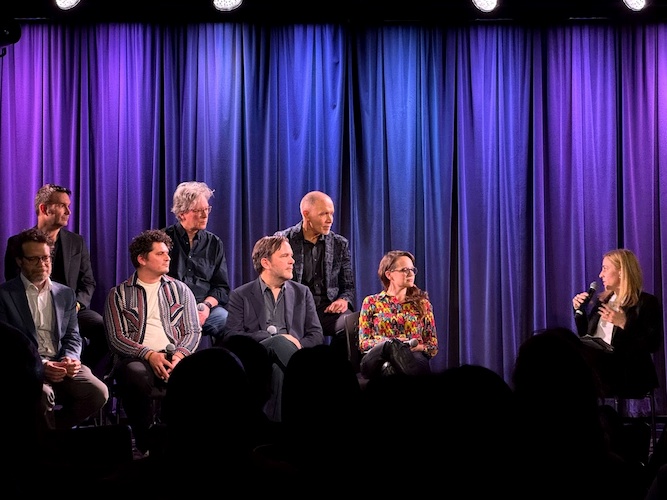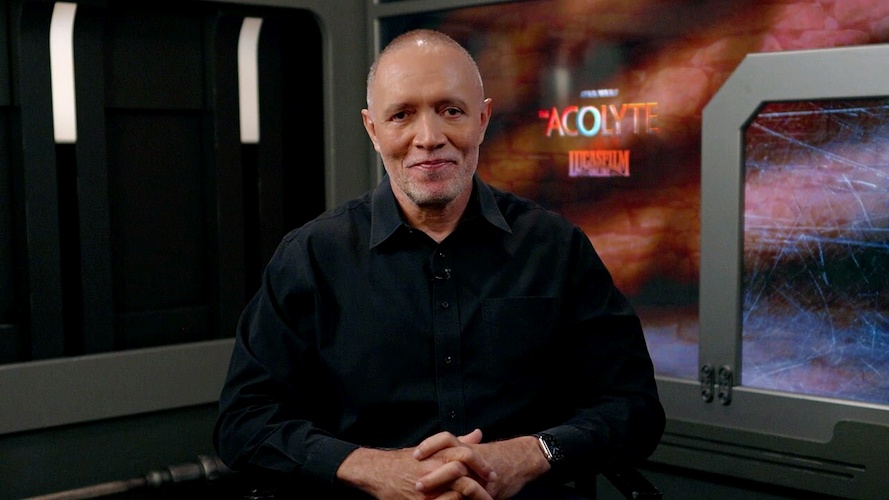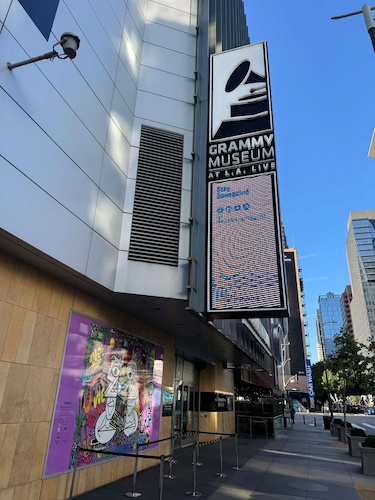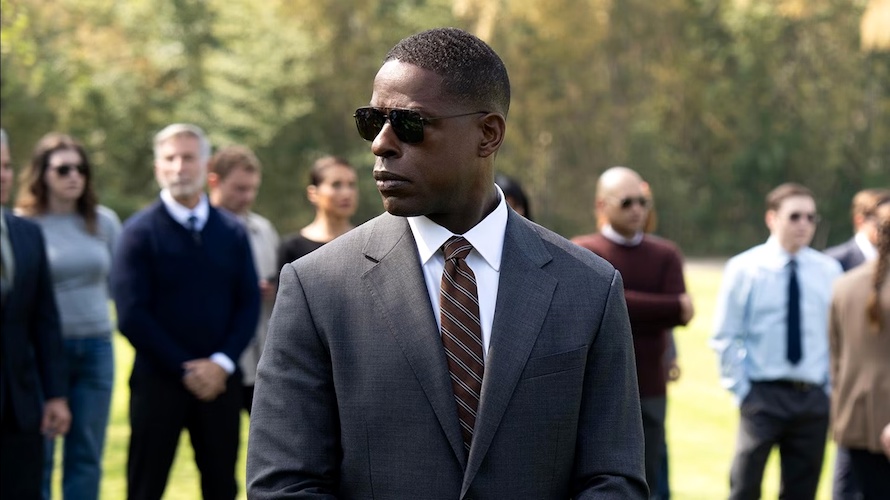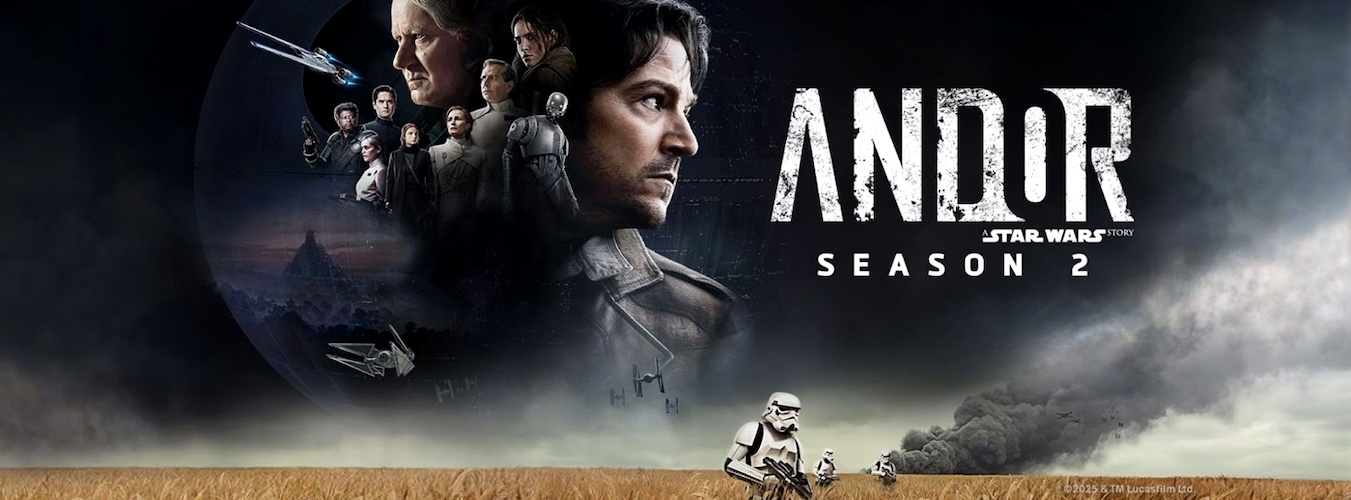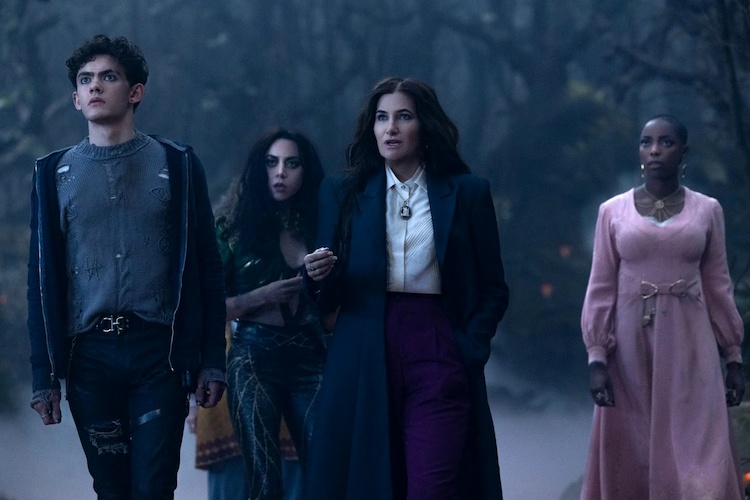Event Recap: Grammy Museum Hosts An Evening With "Andor," "Paradise," "Agatha," "Dying for Sex," "Acolyte," and "Good American Family" Composers
Yesterday evening in Downtown Los Angeles, the Grammy Museum hosted a panel discussion with six composers and one music supervisor from a number of acclaimed Walt Disney Company-produced television series, and Laughing Place was invited to attend. Below is my recap of this fascinating and enlightening conversation.
The moderator for the event was Vice President of the Guild of Music Supervisors Heather Guibert, and the participants included composers Michael Abels (Disney+’s Star Wars: The Acolyte), Brandon Roberts (Disney+’s Andor: A Star Wars Story), Ariel Marx (FX On Hulu’s Dying for Sex), Marcelo Zarvos (Hulu’s Good American Family), Christophe Beck & Michael Paraskevas (Disney+’s Agatha All Along), plus music supervisor Tom Wolfe (Hulu’s Paradise). It kicked off with a clip reel and discussion of The Acolyte, for which composer Michael Abels talked about staying within the “sonic universe" of Star Wars while bringing his own unique style to the show. “Everyone loves Star Wars in their own way. In the case of our show, it’s got all original characters, but it still needs to feel familiar– it needs to feel like that world. The music was going to be one way in which it felt like the Star Wars world. In each scene, I would start by saying, ‘How Star Wars-y is this?’"
Abels went on to talk about the role of duality in The Acolyte and how musical themes helped convey the intent of the series. “A theme is an idea; it’s not a character. I have different moods– [for example] I feel like a hero some days, but I wouldn’t live up to that every day. That was kind of my approach: instead of Sol’s theme, there’s a theme for the aspirational feeling of the Jedi. Sol seems heroic and he’s really noble, but when you see the Jedi doing things that are not good, you don’t hear the triumphant trumpets. I did it based on the emotions the characters were feeling."
Moving on to Paradise, Tom Wolfe talked about the Phil Collins song “Another Day In Paradise" that ties into the title of the series (originally it was intended to be Guns N’ Roses “Paradise City" from the same year)-- “We reprise it at the end, and that became a tool we use frequently. We thought it would never fly because it was too over-the-top, but they went for it each time." Other songs worked into the show were references to the lead character’s palette and the songs he enjoyed from the 1980s. “That wasn’t planned until we got into post-[production]. We just kind of stumbled into that. We pitched a bunch of songs, [and a good number of them were approved]."
Moving on to Andor, Brandon Roberts discussed the process of taking over from composer Nicholas Britell, who scored the first season of the series but was unavailable for most of the second. “It was unique because I’ve been the second guy on some things, and usually their order is, ‘Don’t do what the last guy did,’ but Tony Gilroy basically said, ‘We loved what Nicholas was doing; don’t screw it up.’" He laughed and added that he doesn’t “want people to watch the show as a whole and feel like there were two composers. At the end of season two, we are morphing into [what Michael Giacchino did with the score for] Rogue One. On top of that, you’re also trying to service the needs of season 2 as a standalone." Regardless of that challenge, Roberts said, “Gilroy and everyone [on the crew] really had my back."
“I don’t think I realized how many planets had their own vibe," Roberts continued, touching upon what he learned from jumping into the Star Wars universe for Andor season two. “We had a new palette for each arc. Having this break [between years] was nice, [but] you also have to keep track of the bigger arc of the whole season, the entire series, and Star Wars in general." Then the moderator showed a clip from the much-lauded “Who Are You?" episode. “That episode is a juggernaut of directing and writing, so I had to put my ‘big boy pants’ on. The whole thing turns at the [Ghorman] Massacre, and it means a loss of innocence for the whole galaxy. Fortunately, they got rid of all the sound [in the scene with Syril in the town square], and composers love it when that happens. It was a lot of heavy lifting with music, in a good way. [But it also] required a lot from all departments."
Up next was Dying for Sex, for which Ariel Marx talked about finding the right tone. “That was the terrifying task we all had, including the showrunners. They really bring their comedy expertise, [but it’s about] messiness all over the place– it’s the awkwardness of sex. It’s [also] about the relationships between family [members]. [In the case of] anything to do with cancer or trauma, we played [the music] very very lightly, letting the editing lead. There’s a lot of body-based sound work [and] effervescent synths. I had written 20 different themes, and most of them made it in. It was a master class in tone we were all teaching each other."
After a clip of a particularly powerful scene featuring Dying for Sex star Michelle Williams, Marx continued. “We had extensive discussions during the spotting sessions. [Showrunners Elizabeth Meriwether and Kim Rosenstock] had a very strong North Star about when they were feeling manipulated [by the score]. It [required] a lot of restraint as a composer: ‘How do you not overscore that?’ It was really, really hard."
The fifth show discussed was Good American Family, for which Marcelo Zarvos talked about the twisty true-to-life plot. “From the very beginning we knew there was gonna be a shift in perspective halfway through the season. We were aiming at the fifth episode where the perspective shifts from the parents to [adopted daughter] Natalia. We wanted to shift from a [warm] family drama sound to a colder sound, but keeping the theme. We made it extra sweet, but extra scary as well. Those shades of grey is what music does best– it’s wonderful to get to use that muscle in a show."
After touching on the real-life story that inspired the limited series, Zarvos added, “It’s quite tragic, really, and we were really able to let it rip [with the music]. The complexity to how these characters are shown– the music became a lot more electronic [in the second half]: more guitars, more percussion. The music ends up going to where it’s gonna go. Even the main title [themes] themselves we actually changed for a couple episodes, [then] the final episodes are kind of a mishmash of both [versions]."
Lastly, it was time for a chat about Agatha All Along with Christophe Beck and Michael Paraskevas. “Working in an extended cinematic universe like the MCU is so much fun," began Beck. “We look for any opportunity to establish thematic continuity across series and across films. If you watch these series, you can draw these subconscious connections [via the music]." Paraskevas picked up from there by talking about how this particular series required a different approach: “With Agatha, we’re going the opposite direction and establishing its own sound. We’re getting rid of the french horns and trumpets that you normally associate with heroes. Playing with these expectations really opened up a lot of doors for us."
Next the Agatha All Along composers talked about how they wanted to “really set a foundation of a strong theme associated with each of these characters. We go all in on pastiche [via the different pop-culture homages in each episode], but the character themes are still there. We dress it up however we want, but that really helps carry the journey for them. Those are the opportunities that we relish."
Agatha All Along, Andor: A Star Wars Story, Dying for Sex, Good American Family, Paradise, and Star Wars: The Acolyte are all available to stream on either Disney+ or Hulu. For a calendar of other upcoming in-person events at the Grammy Museum in Downtown Los Angeles, be sure to visit the location’s official website.

